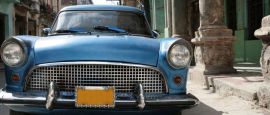Cuba - Money
Currency & Money
Prior to 1 January 2021, there were two types of currencies in Cuba – the Cuban Convertibles Pesos (CUC) and Cuban Pesos (CUP). The CUC was used by visitors, whereas the CUP was used by ordinary Cubans to buy daily essentials.
The Cuban government removed the CUC from circulation after 1 January 2021, and the CUP, now known as 'moneda nacional', becomes the only legal cash currency.
Cuban Peso (CUP; symbol ₱) = 100 centavos. Notes are in denominations of ₱100, 50, 20, 10, 5, 3 and 1. Coins are in denominations of ₱3, ₱1, ¢20, 5, 2, and the rarely used 1 centavo.
You should not take any Cuban pesos out of the country and must exchange them at the airport. The process will require your boarding pass. However, they may be limited international currencies available at that time so you may not be able to change all the Cuban pesos that you have. After immigration, only Euros, Pound sterling or Canadian dollars are accepted.
Mastercard and Visa are accepted, but American Express is not. Having said that, do check with your credit card providers to confirm that your card will work in Cuba.
There are ATMs, but visitors should check with your bank before your travel to confirm that your card will work in Cuba. Also, there are no ATMs available for drawing cash against Cirrus or Switch cards.
You can import an unlimited amount of foreign currency, amounts exceeding US$5,000 must be declared electronically. Technically, you cannot import local currency as Cuban Pesos are not available outside of Cuba. However, it has been reported that residents of Cuba could import up to 2,000 Cuban pesos.
Please note: Since 1 January 2022 all travelers are required to fill in electronically the advance passenger information form "Declaración Jurada de Salud" within 72 hours before departing for Cuba. Travelers will then be provided with a QR code, which they must show in an electronic or printed version to authorities upon arrival. The electronic passenger information form replaced the following documents in their printed versions: International Boarding and Disembarkation Card, Customs Declaration Form and the Traveller's Health Affidavit.
Do you have any Feedback about this page?
© 2025 Columbus Travel Media Ltd. All rights reserved. No part of this site may be reproduced without our written permission, click here for information on Columbus Content Solutions.






 You know where
You know where